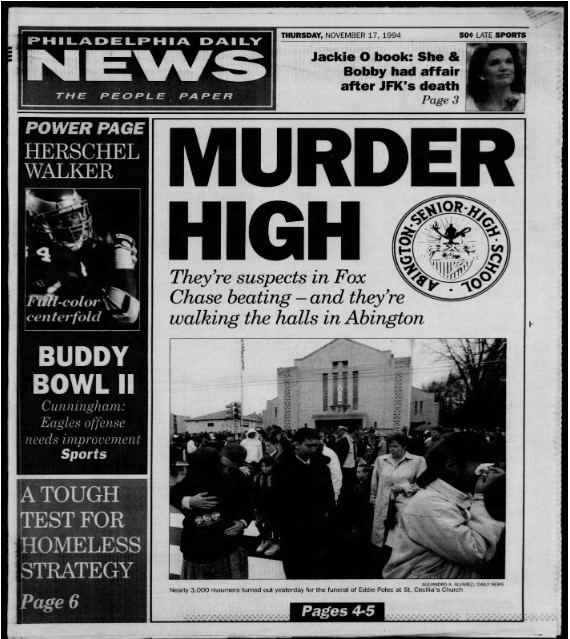Eddie Polec
May 3, 2023
The philosopher George Santayana once said, “Those who do not remember the past are condemned to repeat it.” 1994 was a time when there were only 10,000 websites (compared to 1.3 billion today) and little devices known as beepers were used to send one-lined text messages. Although people often look back at the pre-digital age as a simpler time, it was not immune to tragedy and violence as the Abington and Fox Chase community learned on November 11, 1994– the night 16-year-old Eddie Polec was killed.
The series of events that led to the murder of Eddie Polec in 1994 began outside of a local McDonalds in Fox Chase, a neighborhood in Philadelphia located next to Rockledge. A teenage girl from Abington reportedly was enjoying some food when a group of Fox Chase teens appeared beside her car. They allegedly threw a cup of soda at her car, angering her. As she left the scene, she hissed, “You’re all getting beat up next weekend!”
However, as this incident whispered-down-the-lane and reached neighboring Abington, the situation had morphed from a meaningless spat in a fast-food parking lot into an apparent sexual assault. Upon hearing these rumors, some students from Abington Senior High were furious. They wanted revenge, choosing to seek justice by finding the kids from Fox Chase who had attacked the girl.
That Friday, witnesses reported seeing the teenage girl driving around Fox Chase, followed closely by a car filled with Abington students. They were yelling insults and threats to the residents of Fox Chase. At 9:30pm, multiple cars with Abington teens pulled in at a nearby 7-Eleven. After asking for directions to McDonald’s (there was no such thing as Google maps or GPS in 1994), one of the leaders of this group of vigilantes riled everyone up with: “Come on, we have to do this. We have a job to get done. Let’s do this before the police come.” Before climbing into the car, he was seen jumping up and down saying, “I’m so psyched, I could kill someone!”
They arrived at the McDonald’s a little before 10pm. Armed with hockey sticks and baseball bats, the teens filed out of the cars. Their mission? Causing havoc on the teenagers of Fox Chase. One witness recalled seeing two teenagers being attacked, remarking that it was an unfair fight– thirteen to two. One person was beaten fiercely before a friend was able to pull the individual to safety. The teenagers of Fox Chase ran; Abington teens were right on their heels.
The residents of Fox Chase grew alarmed. At that point, around 50 teenagers were running around causing damage to property. Afraid, residents started calling 911 and reporting the incidents.
Eddie Polec, a 16 year old alter boy from Fox Chase, was waiting for his little brother on the church steps of St. Cecilia’s. When Eddie saw the cars approaching and realized what was happening, he started to run. In a matter of seconds, he was cornered. Innocent, alone, and surrounded by a ruthless mob of kids he didn’t know, Eddie tripped over a thrown baseball bat, falling to the ground where he would eventually be beaten to death. Pleading for his life, Eddie suffered countless strikes from baseball bats and injuries from being kicked with steel tipped boots. Once they had successfully beaten the Eddie Polec down, the Abington teenagers reportedly high fived each other and laughed. Little did they know that their thirst for revenge had led to an innocent death.
Tragically, the 911 dispatch system in Philadelphia failed Eddie Polec that night. Forty minutes after the first of over twenty frantic 911 calls, as 50 angry teens smashed windows and threw rocks, the police finally arrived on the scene. But it was too late. Eddie Polec was found bloodied and beaten on the steps of his childhood church, his head in the lap of a girl attempting to comfort him. Despite the intensive medical treatment, Edward William Polec was pronounced dead on November 12th at 10:24 am, 12 hours after the attack.
His death had a profound effect on the community. Eddie had been well liked and was extremely popular. Over 3,000 people– his entire senior class and much of the Fox Chase community attended his funeral.
On November 17, 1994, the headlines of the Daily News read: “Murder High” beside the logo of Abington Senior High School. Several individuals convicted in the case were from Abington, but even Eddie Polec’s younger brother was quick to say that this headline mischaracterized the students he knew from Abington.
Nevertheless, the question remains: what led those fifty students to leave their houses and drive to Fox Chase? What was the motive for the murderous rampage? Surely a single rumor couldn’t inspire a cross-section of the school to rise up and seek revenge. “We just went down there to fight,” insisted one of the teens who claimed to have been there, “It just went too far.”
What is too far? And why did it go too far? According to a 1996 Report to the United States Attorney General on Current and Future Rates of Juvenile Offending, “From 1985 to 1994, the rate of murder committed by teens, ages 14-17, increased [by] 172 percent.” Was this incident the result of a rise in violence at the time?
Could what happened that night in 1994 align to the concept of “group think?” According to Psychologist Irving Janis, group think is described as, “a deterioration of mental efficiency, reality testing, and moral judgment that results from in-group pressures.” Could there have been the pressure of wanting to fit in with the crowd, the pressure of wanting to feel connected, the pressure of joining together against an alleged threat?
Related to group think is the concept of mob mentality. Interestingly, studies have shown that the larger the group, the easier it is for a few individuals to spread an idea. Some of the causes of mob mentality include heightened emotions, a feeling of anonymity, and the diffusion of responsibility. In other words, a mob can quickly turn violent when people are angry and the group is large enough for individuals to just get swept up by the crowd and not feel individually responsible for the actions.
The tragedy of Eddie Polec’s death brought about change– a non-violence campaign was started at the Abington School District. Along with the Abington Community Task Force, comprised of many school and community leaders, non-violence programming and activities were brought into the schools. Violence was no longer viewed as an urban issue, but rather a universal issue that could impact any neighborhood. The second week in November was declared “Non-Violence Conflict Resolution Week.” The school district sent a non-violence pledge home with every student. Church and community leaders helped promote this pledge, which listed 10 alternatives to violence. The pledge concluded with: “Remember that each day is a new day and try to approach it with a fresh start.” Peer mediation training was bought into the schools. Parent workshops were offered.
The 1995 Oracle yearbook has the title “Reflections.” The 1996 Oracle yearbook has the title “Someday it will all make sense.” While Eddie Polec’s death may never make sense, it is important to reflect as a school community.
As we walk through the halls of Abington, we are the students who will impact tomorrow. We need to learn from those who came before us and continue to make sure that something like this never happens again. With every step and every word, we have the power to view each day as a new day. We have a voice that can inspire the idea of walking away rather than creating violence. We have the power to speak up, stand together, and remember Eddie Polec.


